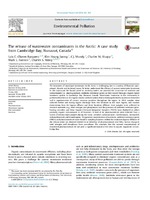The release of wastewater contaminants in the Arctic: A case study from Cambridge Bay, Nunavut, Canada

Fecha
2016Autor
Chaves-Barquero, Luis G.
Luong, Kim Hoang
Mundy, C.
Knapp, Charles W.
Hanson, Mark L.
Wong, Charles S.
Metadatos
Mostrar el registro completo del ítemResumen
The treatment of municipal wastewater in the Arctic is challenging due to a variety of financial, operational,
climatic and technical issues. To better understand the efficacy of current wastewater treatment
in this region and the hazard posed to receiving waters, we assessed the occurrence of nutrients and
contaminants (i.e., pharmaceuticals, antibiotic resistance genes) as they moved through a lagoon-based
treatment system in Cambridge Bay, Nunavut, Canada. Wastewater treatment in this community is
performed by the use of a lagoon-tundra wetland system that is discharged into the marine environment
and is representative of current common practices throughout the region. In 2014, samples were
collected before and during lagoon discharge from two locations in the main lagoon, one location
downstream from the lagoon effluent and three locations offshore. Grab samples were collected to
measure nutrients (e.g., total nitrogen and phosphorus) and the presence of antibiotic resistance genebearing
microbes, and Polar Organic Chemical Integrative Samplers (POCIS) were deployed to collect
passively organic contaminants in all locations. A total of six pharmaceuticals were detected from a
screen of twenty-eight analytes during the study: atenolol, carbamazepine, clarithromycin, metoprolol,
sulfamethoxazole and trimethoprim. The greatest concentrations of nutrients, antibiotic resistance genes
(ARGs), and pharmaceuticals were found in sampling locations within the treatment lagoon. Offshore of
the release point, we observed limited to no detection of pharmaceuticals and ARGs, but no change in
total nitrogen and phosphorus from pre-release. We conclude that the current concentrations of
monitored pharmaceuticals do not pose a significant hazard at this time to aquatic organisms in Cambridge
Bay.
Descripción
Artículo
Fuente
Environmental PollutionCompartir
Métricas
Colecciones
- Artículos [12]

